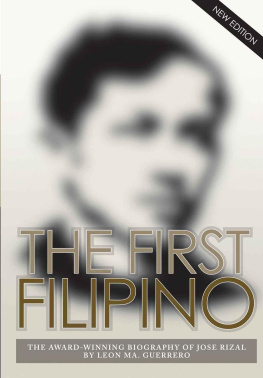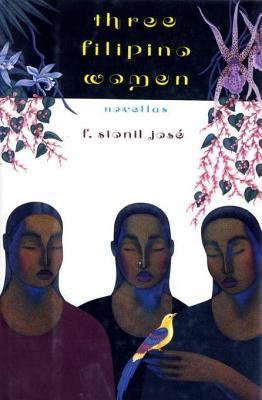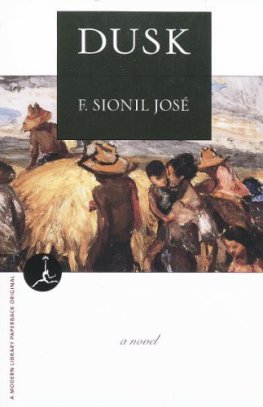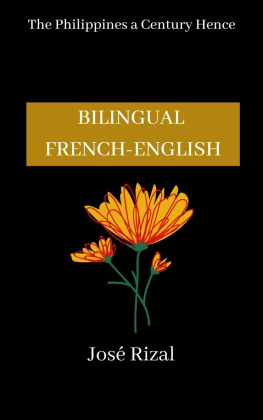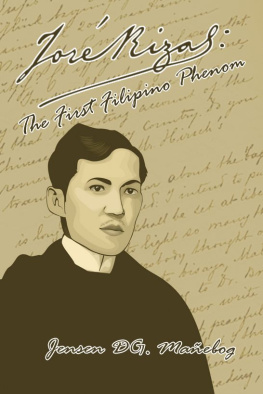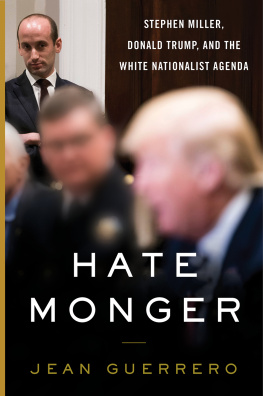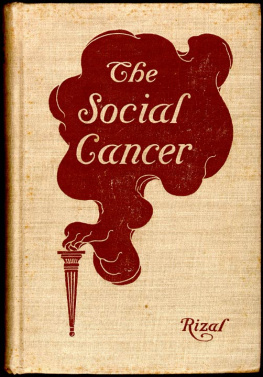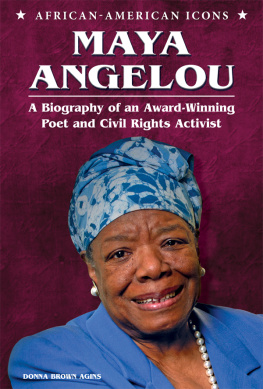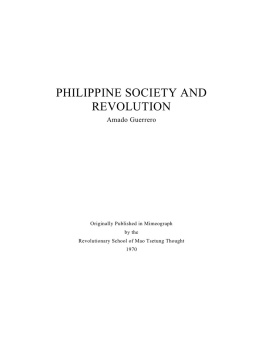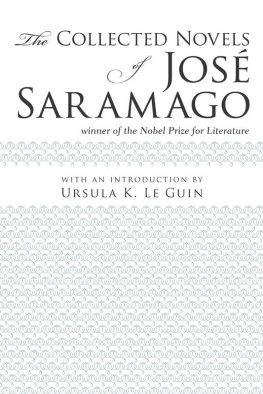Guerrero - The First Filipino: The Award-Winning Biography of Jose Rizal
Here you can read online Guerrero - The First Filipino: The Award-Winning Biography of Jose Rizal full text of the book (entire story) in english for free. Download pdf and epub, get meaning, cover and reviews about this ebook. City: United States, year: 2012, publisher: BookBaby, Made available through hoopla, genre: Non-fiction. Description of the work, (preface) as well as reviews are available. Best literature library LitArk.com created for fans of good reading and offers a wide selection of genres:
Romance novel
Science fiction
Adventure
Detective
Science
History
Home and family
Prose
Art
Politics
Computer
Non-fiction
Religion
Business
Children
Humor
Choose a favorite category and find really read worthwhile books. Enjoy immersion in the world of imagination, feel the emotions of the characters or learn something new for yourself, make an fascinating discovery.
- Book:The First Filipino: The Award-Winning Biography of Jose Rizal
- Author:
- Publisher:BookBaby, Made available through hoopla
- Genre:
- Year:2012
- City:United States
- Rating:3 / 5
- Favourites:Add to favourites
- Your mark:
- 60
- 1
- 2
- 3
- 4
- 5
The First Filipino: The Award-Winning Biography of Jose Rizal: summary, description and annotation
We offer to read an annotation, description, summary or preface (depends on what the author of the book "The First Filipino: The Award-Winning Biography of Jose Rizal" wrote himself). If you haven't found the necessary information about the book — write in the comments, we will try to find it.
Guerrero: author's other books
Who wrote The First Filipino: The Award-Winning Biography of Jose Rizal? Find out the surname, the name of the author of the book and a list of all author's works by series.
The First Filipino: The Award-Winning Biography of Jose Rizal — read online for free the complete book (whole text) full work
Below is the text of the book, divided by pages. System saving the place of the last page read, allows you to conveniently read the book "The First Filipino: The Award-Winning Biography of Jose Rizal" online for free, without having to search again every time where you left off. Put a bookmark, and you can go to the page where you finished reading at any time.
Font size:
Interval:
Bookmark:

PART ONE

I
Something To Remember
Grass grows quickly over a battlefield; over the scaffold never.W INSTON C HURCHILL Had it not been for the events of 1872, Rizal would have been a Jesuit!R IZAL[1]
Our story begins with an execution which prefigures its end.
Late in the night of the 15th February 1872, a Spanish court-martial found three secular priests, Jos Burgos, Mariano Gmez and Jacinto Zamora, guilty of treason as the instigators of a mutiny in the Kabite navy-yard a month before, and sentenced them to death.
The Spanish newspaper, La Nacin , described Burgos as a Spaniard born in the Philippines, parish priest of the Manila Cathedral, and a man of rather valuable social graces. Although to all appearances modest, he was ruled by the contrary passion, which, according to some, explains his political errors.
Zamora, according to the same newspaper, was also a Spaniard born in the Philippines and parish priest of Marikina. He was a troublesome character, not very friendly to Spaniards, and had given serious offence to the authorities, mainly Brigadier Orn, governor of Manila in 1867, to whom, on a trip he made to Marikina, Father Zamora denied the honors due to any provincial governor.
Gmez, parish priest of Bacoor, was a native of Kabite, a Chinese half-breed and very old, perhaps more than 70. He had aroused the suspicions of the Spanish authorities more than once, but in view of his age and experience in the cure of souls he had been made his archbishop's vicar in the province, having under his jurisdiction a number of Dominican and Recollect friars who had parishes in it.
The judgment of the court-martial was read to the priests in Fort Santiago early the next morning and they were told it would be executed the following day. A French chronicler reports that upon hearing the sentence, Burgos broke into sobs, Zamora lost his mind and never recovered it, and only Gmez listened impassively, an old man accustomed to the thought of death.
The news of the judgment appears to have spread rapidly, and thousands of Filipinos gathered in the fields of the new town called Bagumbayan where the executions would take place. The three priests were to be taken in a closed coach to an improvised death cell set up near the scaffolds, but when it was delayed the commanding officer of Fort Santiago ordered the condemned men to be taken in his own carriage. Thus it was in an elegant burnished carriage, whose magnificent horses were led by two infantry sergeants, that the three priests were taken to their death cell; it was, we were told, more of a triumphal march than a funeral cortege, for the Filipinos in their thousands saluted the three priests with their handkerchiefs.
Burgos, Gmez and Zamora had been stripped of their priestly robes and were chained hand and foot. When friars and Filipino seculars offered to shrive them, the court-martial's advocate-general mocked the condemned men.
Surely you do not want to confess to Spanish priests?
You are fooling yourself, replied Gmez. Nothing better, if we are to understand each other.
Burgos chose a Jesuit; Zamora a Vincentian.
We were told that the death cell was visited by Filipinos from as far away as Bulakan, Pampanga, Kabite and La Laguna. When dawn broke on the 17th February there were almost forty thousand of them surrounding the four platforms where the three priests and the man whose testimony had convicted them, a former artillery man called Salda, would die.
Salda, who had claimed to handle Burgos's correspondence with the mutineers, had hopes of a reprieve to the last moment. He was the first to be called and, even as he seated himself on the iron rest projecting from the post of the garrote and felt its iron ring around his neck, his eyes searched desperately for the royal messenger. The executioner quickly put an end to the informer's hopes with a turn of the screw that broke his neck.
The three priests followed Salda; Burgos, weeping like a child, Zamora, with vacant eyes, and Gmez, head held high, blessing the Filipinos who knelt at his feet, heads bared and praying.
Gmez was next to die. When his confessor, a Recollect friar, exhorted him loudly to accept his fate, he replied: Father, I know that not a leaf falls to the ground but by the will of God. Since He wills that I should die here, His holy will be done.
Zamora went up the scaffold without a word and delivered his body to the executioner; his mind had already left it.
Burgos was the last, a refinement of cruelty that compelled him to watch the death of his companions. He seated himself on the iron rest and then sprang up crying: But what crime have I committed? Is it possible that I should die like this? My God, is there no justice on earth?
A dozen friars surrounded him and pressed him down again upon the seat of the garrote , pleading with him to die a Christian death.
He obeyed but, feeling his arms tied round the fatal post, protested once again: But I am innocent!
So was Jesus Christ, said one of the friars.
At this Burgos resigned himself. The executioner knelt at his feet and asked his forgiveness.
I forgive you, my son. Do your duty. And it was done.
We were told that the crowd, seeing the executioner fall to his knees, suddenly did the same, saying the prayers for the dying. Many Spaniards thought it was the beginning of an attack and fled panic-stricken to the Walled City.
Seventeen years later Rizal would write to Ponce: If at his death Burgos had shown the courage of Gmez, the Filipinos of today would be other than they are. However, nobody knows how we will behave at that culminating moment, and perhaps I myself, who preach and boast so much, may show more fear and less resolution than Burgos in that crisis. Life is so pleasant, and it is so repugnant to die on the scaffold, still young and with ideas in one's head
[2]
Indeed, it was an age of ideas.
For more than sixty years before the Kabite navy-yard mutiny of 1872 (and for more than sixty years after) Spain herself had been (and would be) driven apart by a battle of ideas, the battle between traditional absolutism and liberalism, a word, incidentally, which in its modern political sense was first used in Spain.
That ancient realm had been subtly infiltrated by the subversive ideas of the French Enlightenment under the Bourbon Carlos III, and, when the Spanish monarchy went into political bankruptcy under his successors Carlos IV and Fernando VII, the bewildered Spaniards were left with their destiny in their own hands until Wellington finally brought formal victory to their guerrilla war of resistance. Four years earlier they had summoned Cortes, which, in the historic Constitution of Cdiz of 1812, was declared to be the sole repository of national sovereignty and the legislative power. The nation was defined as comprising all Spaniards, and a Spaniard as being any man, not a slave, born and domiciled in the peninsula and the overseas provinces, thus including the natives of the Philippines, who were also given representation in the Cortes.
The Philippine Revolution was thus, in a sense, made in Spain. Equal political rights and guarantees for peninsular Spaniards and Spanish subjects in the Philippines, including representation in the Cortes, would be the constant objective of the Filipino reformers and agitators; it would justify the move for assimilation into Spain; it would sustain the pathetic hope of reforms; and, when finally denied, it would drive the activists to arms. The battle, then, would not be between Spain and the Philippines; that is an over-simplification. In simple justice it must be said that Spain herself was an older and a larger battlefield for the same ideas, and Spaniards had fought and would fight Spaniards much longer and with greater devotion and ferocity for these ideas than ever Filipinos would fight Spaniards.
Next pageFont size:
Interval:
Bookmark:
Similar books «The First Filipino: The Award-Winning Biography of Jose Rizal»
Look at similar books to The First Filipino: The Award-Winning Biography of Jose Rizal. We have selected literature similar in name and meaning in the hope of providing readers with more options to find new, interesting, not yet read works.
Discussion, reviews of the book The First Filipino: The Award-Winning Biography of Jose Rizal and just readers' own opinions. Leave your comments, write what you think about the work, its meaning or the main characters. Specify what exactly you liked and what you didn't like, and why you think so.

